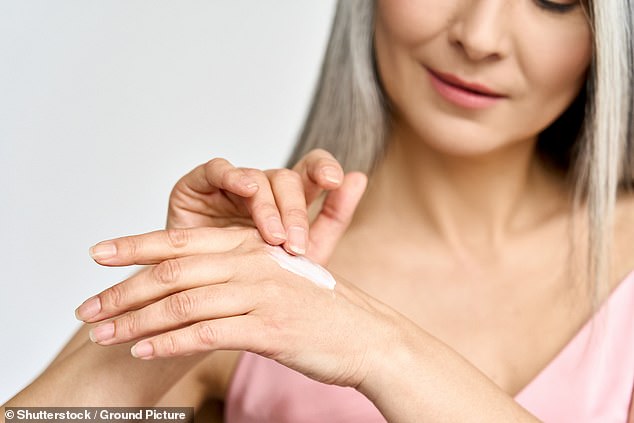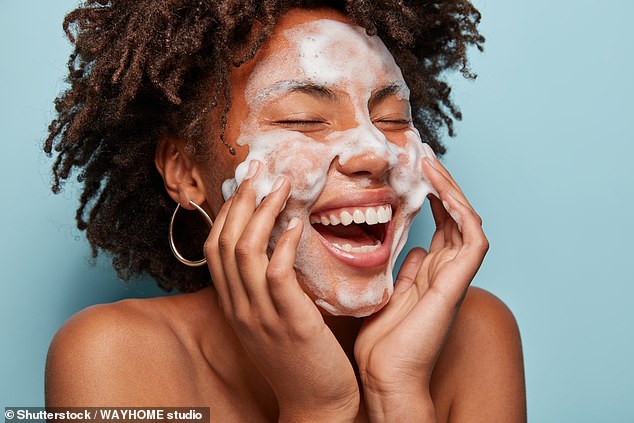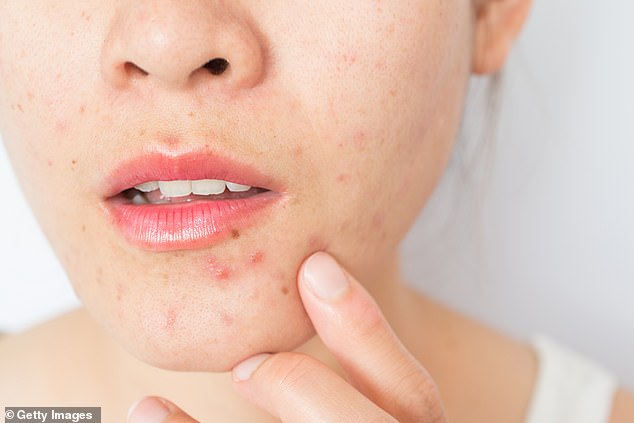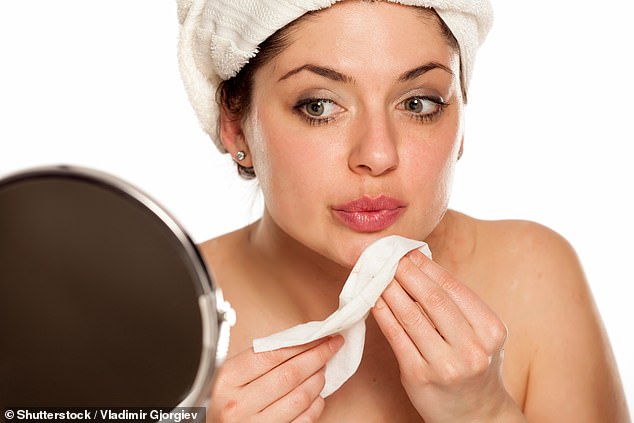Are YOU washing your face wrong? Top dermatologists reveal the five common mistakes to avoid
>
Scrubbing your face with soap, hot water and a flannel? Well, you might be washing your face wrong, according to dermatologists.
Exfoliating too much, washing with overly hot water and using too many disposable wipes are some of the biggest mistakes people make when washing their face.
These techniques can destroy your skins natural barrier, dry it out and clog your pores.
MailOnline spoke to dermatologists to find out what we should be avoiding when it comes to keeping our faces squeaky clean.
Exfoliating too much, washing with overly hot water and using too many disposable wipes are some of the biggest mistakes people make when washing their face
Product overload
From charcoal facemasks to moisturising your face with Vaseline, social media is awash with skin-cleansing tips, but following these trends might not be the best way of maintaining a healthy glow.
Dermatologists warn that having too many steps, with too many different chemicals can strip your skin of its natural oils, making it sore and dry.
And just because someone famous has recommended a product does not mean it is right for your skin.
Dr Penelope Pratsou, consultant dermatologist and British Skin Foundation spokesperson said: ‘The most common mistake that people make with skincare routines is that they tend to overcomplicate them.
‘People like to follow the latest skincare trends as recommended on social media.
‘This can often result in complex regimes which may not be suited to their own skin and result in skin irritation.’
But there is no ‘one-size fits all’ when it comes to skincare. Your routine should be unique and tailored to your skin type, according to Dr Pratsou.

Your routine should be unique and tailored to your skin type. Dermatologists warn that having too many steps can lead to irritation and just because someone famous has recommended a product does not mean it is right for your skin
‘Do not feel you need to follow a particular regime because someone famous has recommended it,’ she added.
Dr Salome Dharamshi, a dermatologist at a private clinic in Birmingham, believes that ‘less is more’ and suggests sticking to a simple routine, such as one that has two to four steps.
She said: ‘Wash your face in the morning, apply moisturiser and SPF.
‘In the evening before you go to bed double wash the face, remove your make-up and then wash again gently to make sure the skin is clean and apply moisturiser.’
However, experts urge people to stay away from bars of soap and use other gentle facial washes.
This is because the alkaline chemicals in bars of soap can be abrasive, drying and disrupting the natural PH of your skin.
The natural PH of your skin is slightly acidic, it helps to keep moisture in and bacteria out.
If this balance is pushed to be more acidic you are more likely to get skin conditions, such as acne and eczema and if it is too alkaline your skin can look dry, red and flaky.
Stop scrubbing
Another common mistake people make is overly scrubbing their skin.
Although scrubbing will remove dead skin cells, oils and dirt helping to make skin appear flawless, it will also remove healthy cells from the skin, according to experts.
This can lead to irritation, just in the same way as adhering to an overly-complicated regime.
Dr Pratsou said: ‘I am not a fan of physical exfoliation on the face because it can often be traumatic to the skin, and cause irritation, dryness or breakouts.’
Instead she recommends using a chemical exfoliator, such as glycolic acid and retinols, as these work over about 10 minutes to gently exfoliate, with noticeable results in two weeks.

Having water too hot or even too cold can over dry the skin, which in turn can cause the over production of sebum making it greasy, and as a result, spotty
Dr Pratsou added: ‘Micro-fibre face cloths are thought to be gentler on the skin, helping to exfoliate for those that have sensitive skin.
‘They might therefore be helpful if you wear make up to help remove it at the end of the day.’
Dr Dharamshi agrees that a micro-fibre cloth is a good gentle exfoliator, as is a soft sponge. However, some flannels and harsh brushes can damage healthy skin cells.
However, Dr Kajal Babamiri, a dermatologist at the private CLNQ clinic in Manchester, says we should be putting the face cloth down altogether in favour of simply using our hands to clean with a water and a gentle wash.
She said: ‘Definitely use your hands to wash your face.
‘A cloth can be too abrasive, you are taking a lot of skin away.
‘What you want is to take the dead skin away but not be too aggressive that it actually damages the skin.’
You’re over washing
Washing your face twice a day is the optimum amount, according to dermatologists.
Keeping it to just morning and night will help wash away dirt and grease and keep imperfections at bay.
But, if you start trying to clean it any more than that, you could end up with dry, irritated or even spotty skin.

Keeping washes to just morning and night will help wash away dirt and grease and keep imperfections at bay for normal skin types
Dr Dharamshi explained that over washing not only causes dryness but, acne too.
She said: ‘Over washing the face can increase over production of sebum, which is one of the reasons for acne,
‘It can also damage the skin barrier, cause redness and dehydration of the skin.’
Dr Pratsou also warns that for those who are prone to eczema, even water can be an irritant causing flare ups.
Medical moisturising treatments are suggested by dermatologists if you suffer with eczema flare ups.
For normal skin types Dr Pratsou advises: ‘Sticking to the same principles of starting both daytime and night-time routines by cleansing your skin with a suitable cleanser for your skin type, and ending them with an appropriate moisturiser.’
She added: ‘I would always recommend adding a sunblock to protect your skin from the sun’s rays year-round.’
Hot water
If you’re using hot water you may want to turn the temperature down just a bit.
Having water too hot or even too cold can over dry the skin, which in turn can cause the over production of sebum making it greasy, and as a result, spotty.
Dr Dharamshi said: ‘Water should be warm, very often people use water that is too hot or cold.
‘If the water is too hot it can damage the skin, it can cause redness and it over dries the skin. It also damages the skin barrier.’
Lukewarm water is the happy balance for washing your face, according to experts.

Although scrubbing will remove dead skin cells, oils and dirt, it will also remove the healthy cells from our skin, according to experts. This can lead to irritation, including sore or dry skin and eventually breakouts
Although some people use hot water to open the pores and then cold water to close the pores, Dr Dharamshi claims this doesn’t actually work.
In fact, she goes as far to say that opening your pores is technically impossible.
Because your pores are not muscles, they can’t open and contract, so there is little to no benefit of doing this.
But there is some logic behind the myth.
When you splash your face with warm water it simply loosens the sebum, which is the oil in your face, allowing it to slide out the face, Dr Dharamshi explains.
Similarly, splashing cold water on your face causes the muscles to contract which makes the skin feel tighter, but your pores will not get any smaller.
Ditch the wipes
Face wipes can be handy because they appear to wipe your face clean in seconds.
But skin experts are not fans of the convenient product, sold for pennies on the high street.
Disposable face wipes can be good at removing make-up, but they are not designed to be used to wash your face daily.

Disposable face wipes can be good at removing make-up, but not all are designed to be used to wash your face daily and using water could be better, dermatologists warn
Dr Babamiri said: ‘Face wipes are good at removing makeup, but that should not be your cleanser and not for washing your face.’
In fact, if you have nothing else to wash your face with that day, using water could be better than using the packet ready wipes, dermatologists warn.
Dr Pratsou said: ‘Using a suitable cleanser with water, with or without a reusable facial cloth is preferable to using disposable face wipes.’
This is because wipes are also not as efficient at wiping away all the grime, make-up and oil from the day.
If grime is left behind on the face, then over time it can lead to clogged pores, breakouts and irritation from residual product on the skin.
